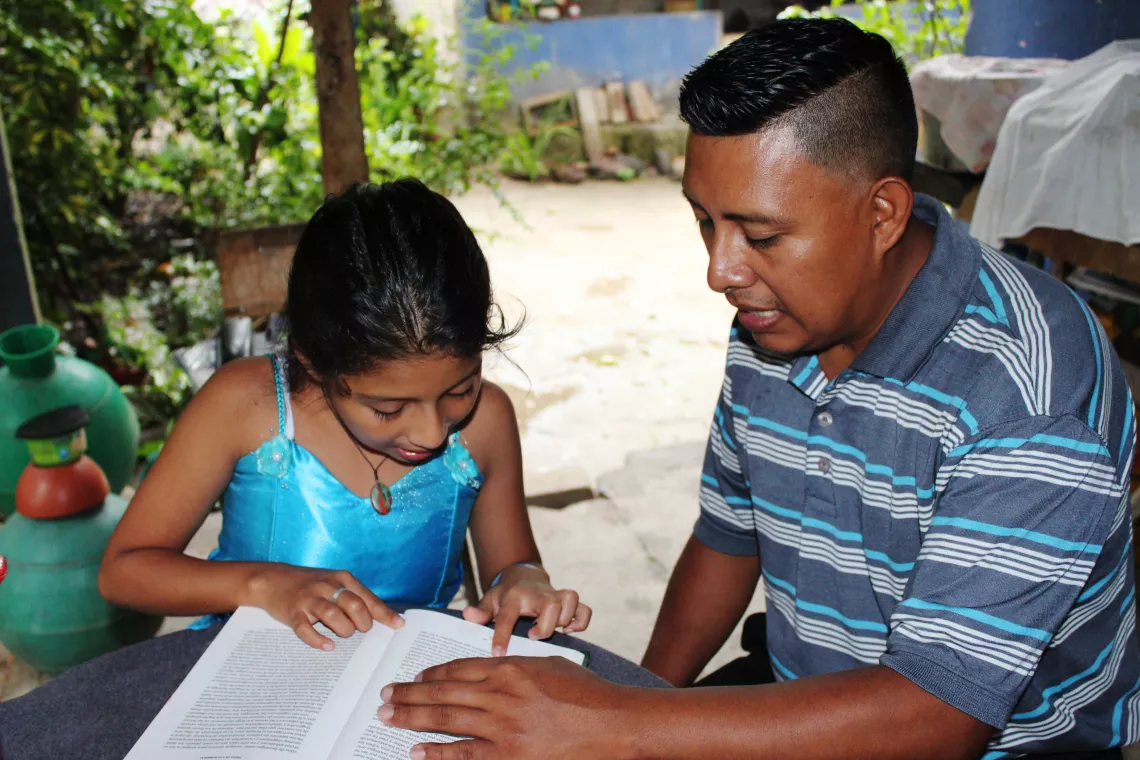A brighter future for children in a region plagued by violence
In one of El Salvador’s most dangerous neighbourhoods, a father raises his children to be community leaders

- Available in:
- English
- Español
David Corena was raised without a father. When he separated from his partner shortly after their daughter was born, he promised himself he would be a present, supportive parent. Find out how he's raising Lupita and his two young stepchildren to be leaders in a community plagued by gang violence.
SANTO TOMAS, El Salvador, 8 September 2017 – Shortly after Lupita Corena was born 11 years ago, her parents separated. They decided Lupita would stay with her father, David.
After growing up in a fatherless home, David knew that he wanted to be there for his daughter in the way that his own father never was. He promised himself from that point forward that he would never stop loving her, supporting her, educating and protecting her.
“I have always wanted to enjoy every single moment with her, since she was a little baby, because seeing a small child grow are very beautiful moments for a parent,” says David.
“To see when she takes her first steps and starts walking or when she says her first word, and then start talking…all those moments are so special and stay with you forever.”
Fear and violence plague the region
David’s support and protection is particularly important for his daughter because of the context in which they live.
Organized crime has grown in El Salvador and neighbouring Honduras and Guatemala in the wake of civil wars, which left many people unemployed and with easy access to weapons. Heavily armed gangs now have tens of thousands of members in the three countries, where they engage in extortion, assassinations, drug trafficking, car theft, illegal gun sales, kidnappings and turf wars.
With 103 homicides per 100,000 residents in 2015, El Salvador has the highest murder rate in the world. Santo Tomás, where David and Lupita live, is among the most violent municipalities. Many children and families choose to flee, making a dangerous journey north for safety and opportunities.

Setting an example
Growing up without her mother has had its difficulties for Lupita – like feeling awkward when asking her father about women’s body issues. But she is grateful for everything he’s given her.
“He has always been supportive and he has never turned his back on me,” she says. “I have always been with him.”
David feels so empowered in his role as a father that two years ago he took the responsibility of his current partner’s children: Katherine, aged 12, and Steven Alexander, aged five. Both stepchildren have different fathers who were never present in their lives.
“I love him as if he were my father. He has never despised me or my brother. He loves us as if we were his real children,” Katherine says.
Every day, the three children eagerly wait for their father to come home from work. Their evening routine is to sit at the dinner table to eat together and talk about their day. They have a family tradition to light a candle while dad talks to the children about values and shares stories with a moral with them.
From child to community leader
Today, Lupita is described as a ray of sunshine and a leader in her community. She is outspoken and resilient in the face of the many obstacles brought on by poverty and violence.
Both Lupita and Katherine are following the example of their father and mother who are active advocates for children’s rights. They participate in projects that improve their neighbourhood, including the Conacaste Eco Cultura program, an initiative supported by UNICEF to promote safe, educational and creative spaces for families in Santo Tomás.
The early care, guidance and nurturing that Lupita received from her father have helped her become who she is today. Her family, especially her father, are very proud of her.
“I am concerned about the current situation (in the country) which gets me thinking that I don’t want a dark future for my daughter,” says David.
“I want her to be a confident and smart young lady who can take care of herself… I want her to grow healthy and happy, and to develop in the best way possible in this society.”
Conacaste Eco Cultura is child-friendly space that aims to reintegrate children into communities and addressing some of the causes of violence and migration in El Salvador. The park is set up in an abandoned public space that has been transformed into a safe space for children and adolescents to play and participate in activities such as painting, sports, music and photography. This space is also a way for UNICEF to identify children who need support and encourage them to re-enter the formal school system.



